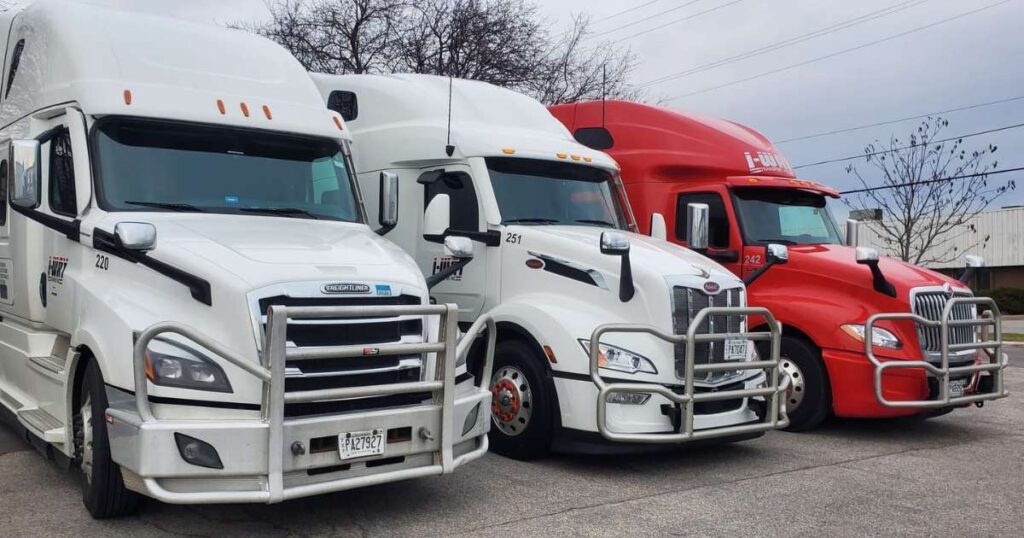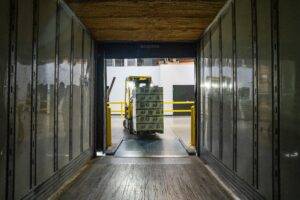Full truckload, usually abbreviated as FTL and TL, describes a shipment that fills a whole truck (truckload). Shipping companies often choose this option when they have enough cargo to fill a 48- or 53-foot trailer past the halfway point. In FTL shipping, one single shipper has exclusive usage of an entire truck. This signifies that the truck is carrying the goods of a single shipper throughout the journey.
The shipper schedules a pick-up time, and the carrier sends a truck to the location, where the truck is loaded and sealed with the shipper’s freight. Once loaded, the products are driven directly from the point of origin to the final destination. Because of this, shipping times decrease and fewer people need to handle deliveries.
FTL freight shipping is the most cost-effective choice when the shipper has enough cargo to load a trailer. Trucks that transport freight by the truckload (FTL) can be dry vans, refrigerated trucks, or flatbeds.
Why Choose Full Truckload Shipping?
Full truckload shipping guarantees that all of your items will arrive together at their destination within the allotted time frame, regardless of whether they are dry, refrigerated, bulk, or flatbed shipments. There are many advantages to full truckload shipment, including those listed below.
1. Reduced Transportation Expenses
Shipping and transportation costs can be reduced in comparison to “Less than Truckload Shipping” if the volume of your items is sufficient to fill the entire carrying and storage capacity of the truck or container in which they will be transported (LTL)
2. Fewer Breakdowns
When a truck is solely transporting your company’s goods, there’s no need for it to make any stops along the road. On the other hand, if a truck is transporting the goods of more than one business, it may need to make many stops to unload the items of the other businesses. Your items will be relocated or handled in the process. Choosing FTL shipping guarantees uninterrupted transport with no delays.
3. Dedicated Delivery
Full truck load (FTL) shipping means that an entire truck will be stuffed with only your items. Products from rival businesses are not accepted. Doing so guarantees that all of your items will arrive at its destination without any mishaps. When you ship something, you normally have to have the vehicle modified to fit the specifics of the load. The trucking company will treat your consignment with extra care because it is unique.
4. Avoiding Any Extra Handling
Your products are not handled or disturbed while being transported. Once the essential documentation has been taken care of, the driver loads your products in the exact way you want them to be packaged and shipped. When the vehicle reaches its destination, only then are the items unloaded.
5. Tailored Assistance
When it comes to transporting the same goods day in and day out, committed truck drivers are the masters. Such drivers are an advantage to have while transporting your items. They are familiar with the proper procedures for loading and unloading cargo. Choosing FTL means you can arrange for specialized shipping.
6. Guaranteed Procedures
FTL Operators guarantee that the products they carry are insured. This option gives more peace of mind for the customer, and adds an additional layer of insurance for the products that you are transporting
Benefits of FTL
1. Modest Loss
There are fewer potential points of failure when transporting a full truckload than when transporting LTL. The longer it takes for a vehicle to reach its destination, the greater the risk of damage. During FTL, the shipment does not have to be combined with others or broken apart. Freight companies can continue to transport goods without having to offload any.
2. Reduced Delivery Time
When shipping by truckload, all of the packages stay together on the same truck. There is no longer any need for the numerous steps typically associated with LTL transport. By avoiding the time-consuming step of freight consolidation, FTL significantly shortens the time it takes to send a shipment.
3. Different Shipments Available
Large, perishable, high-risk, non-stackable, or hazardous cargo is best transported through FTL. It’s not common practice to enable multiple high-risk shiploads to share a single vehicle. Shipping via LTL presents significant challenges for bulky, perishable, or otherwise non-stackable items. Damage in an LTL cargo would cost more than the little premium for FTL shipping.
Problems That FTL Shipping Has To Deal With
When it comes to shipping costs for a full truck, small and medium-sized firms inevitably come out on the losing end. However you choose to move goods, know that capacity is restricted, trucking expenses are higher, and the system is convoluted. Costs vary not only because each airline has its own pricing structure, but also because the volume of travel to each location is unique. You need to oversee such operations. Many companies still choose full truckload shipments over LTL shipments for a variety of reasons.
1. Capacity Limitations
One of the major problems with FTL is how tight the available capacity is. While capacity limits are more common in LTL shipping, they can also affect FTL. It can be difficult for small and medium-sized enterprises to find truck capacity when more large firms book hundreds of drivers, reducing the number of accessible options on the market. The best way to deal with this is to stay on top of your plans. Your chances of getting your cargo transported are slim to begin with, and they will get even slimmer as vehicles reach capacity. Plan ahead of time to give yourself the best chance of success.
2. Rate Fluctuation
Market conditions determine the frequency of FTL shipments. This reliance is a problem with whole truckload shipping, unfortunately. Bookings and agreements with a low volume will often have higher rates than those with a large volume. All shipments are probably booked on spot rates because small and medium-sized businesses do not schedule massive amounts of freight (opposed to large-volume contract rates).
Spot rates, on the other hand, are often lower than contract rates, thus shippers that opt to pay the lower rates can profit from market fluctuations. Keep in mind that your exposure to market fluctuations will increase if you do not book significant entire truckload volumes with your freight forwarder.
3. Loading/Unloading Fees
If your loading and unloading times surpass the allowed time by your carrier, they may begin billing you. A typical four-hour move includes two hours of loading time and two hours of unloading time. If you go beyond these allotted times, you will be charged a fortune. Smaller and medium-sized enterprises may have to reduce their transportation budgets as a result of these price hikes, while larger corporations may be able to absorb them with ease.
One of the challenges to full truckload shipment is the time required to load a trailer. The single most critical thing you can do to reduce loading time is to properly package, wrap, palletize, and stack your freight. If everything is ready at the dock door for the trucker, loading the goods will take much less time.
When to Use FTL Freight Shipping
In what circumstances might you benefit from FTL freight shipping? We’ve covered many essentials while discussing the benefits and cons of FTL freight, so let’s talk about particular cases.
1. Large Shipments
A shipment of more than 10–12 pallets or weighing more than 10,000 pounds will certainly benefit financially from LTL freight delivery.
2. Meeting Target Time Frames for Shipping
By opting for FTL shipping, you can increase your chances of an on-time pickup and delivery when you have a strict deadline to meet. The likelihood of missing a delivery window decreases as the number of stops increases.
3. Transport of Perishable Items
Another great use for FTL transport is the delivery of perishable commodities. It guarantees the quickest shipping times with the fewest interruptions.
4. Shipping Expensive Or Fragile Goods
Since less time is spent moving FTL cargo around to make room for other commodities or loading and unloading, less opportunities exist for damage to occur. An FTL shipper can put items strategically within trucks to ensure they reach their final destination intact.
In a Nutshell
Moving a lot of freight can get expensive, but with FTL freight shipping, shippers can save a lot of money. With this service, you can schedule a pickup and delivery conveniently, and your shipment will arrive quickly and with minimal handling. Shippers may boost transportation efficiency and save expenses thanks to this, and it also helps save money when transporting vast quantities of goods. Hiring a third-party logistics service provider (3PL) will be your best bet if this is your first time shipping a full truckload. I-Way logistics is a fantastic option if you’re already handling a high volume of FTL shipments but might need some assistance staying organized.




